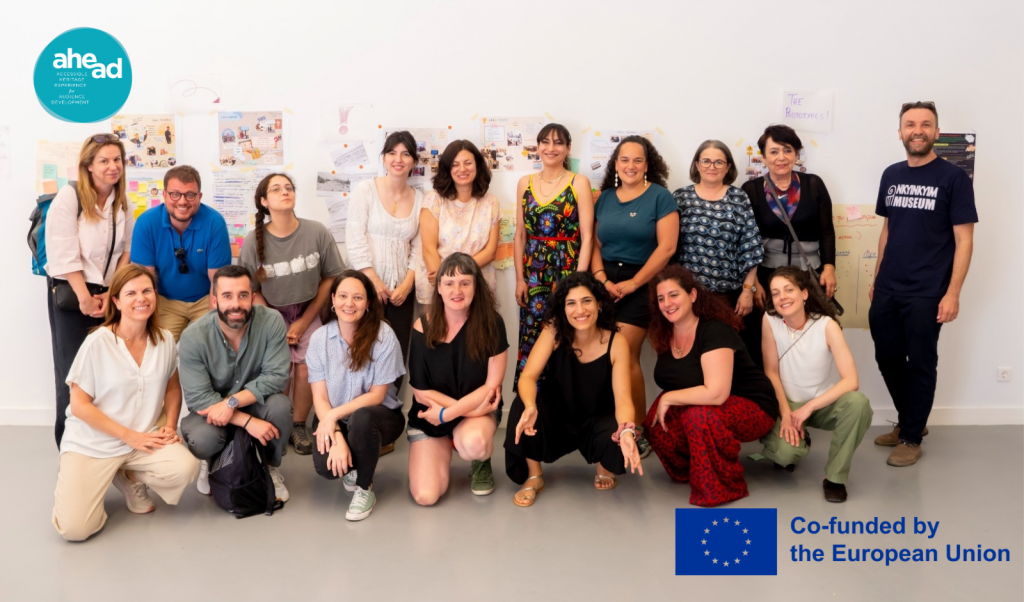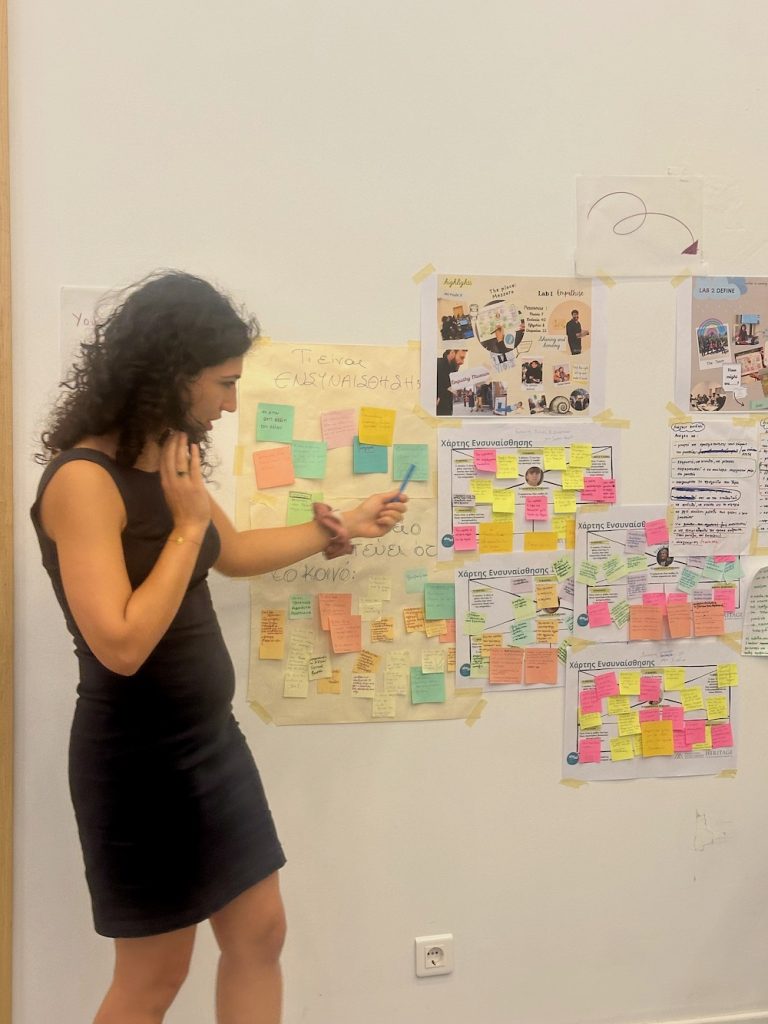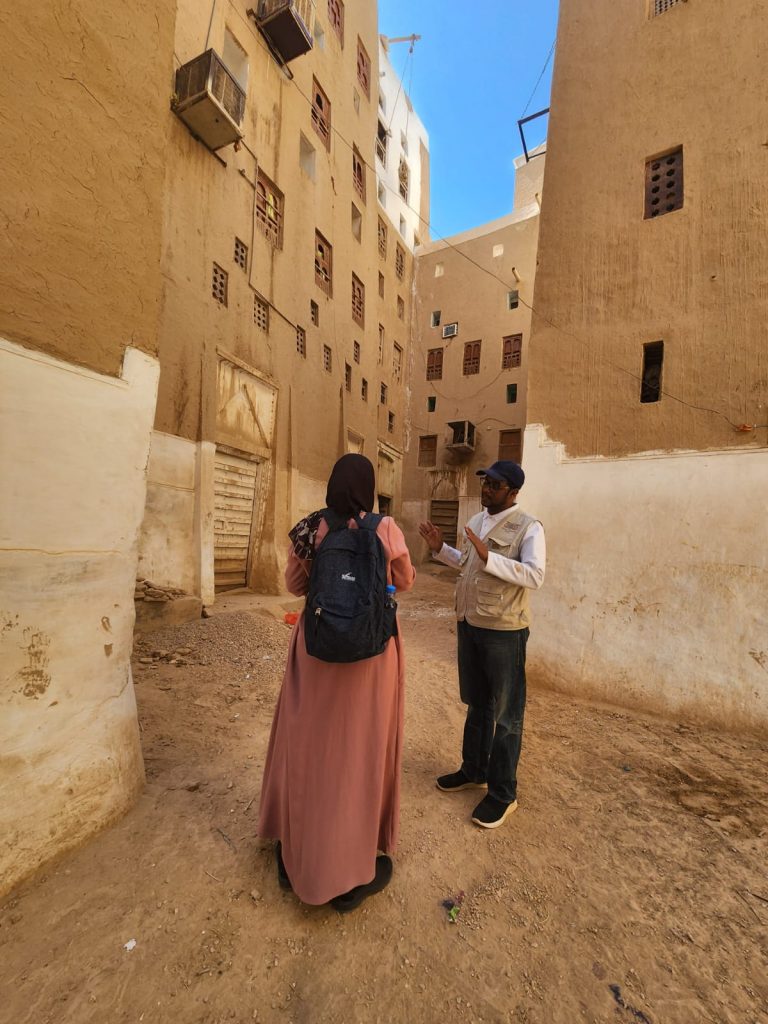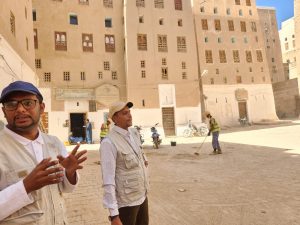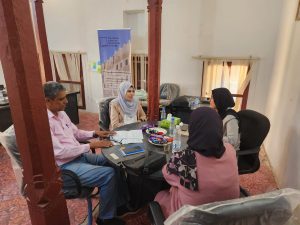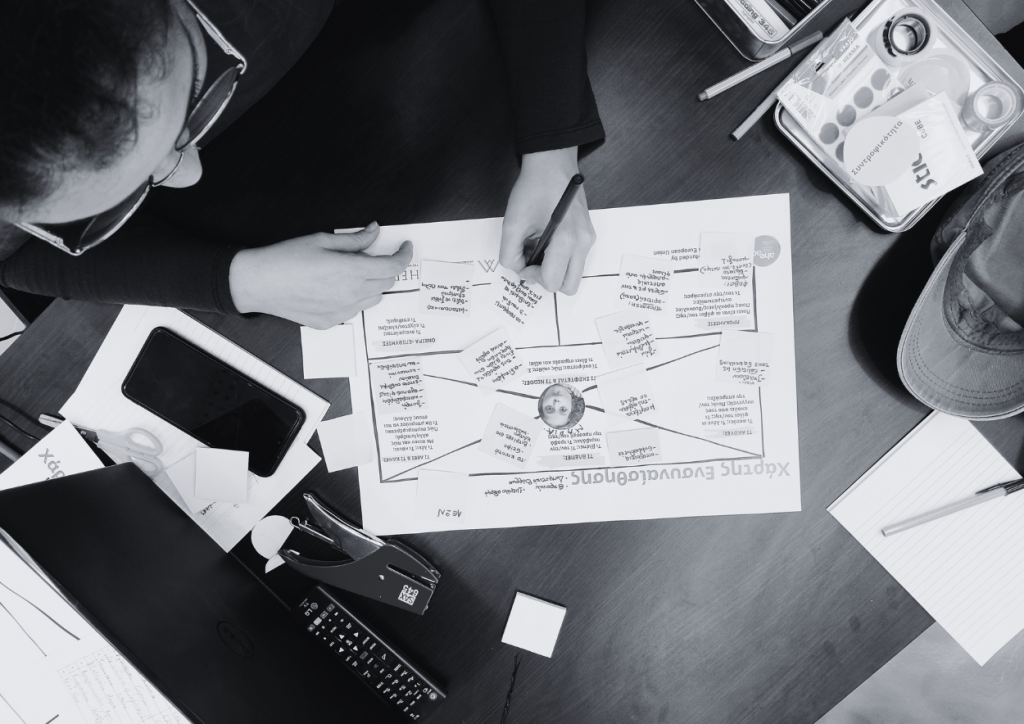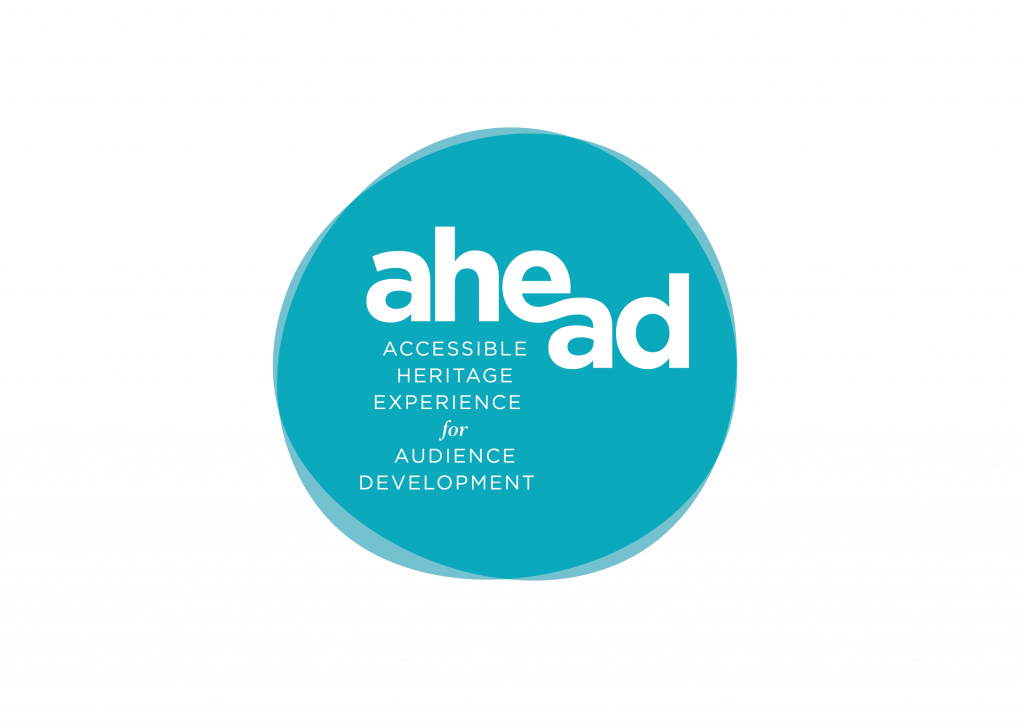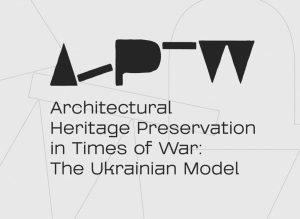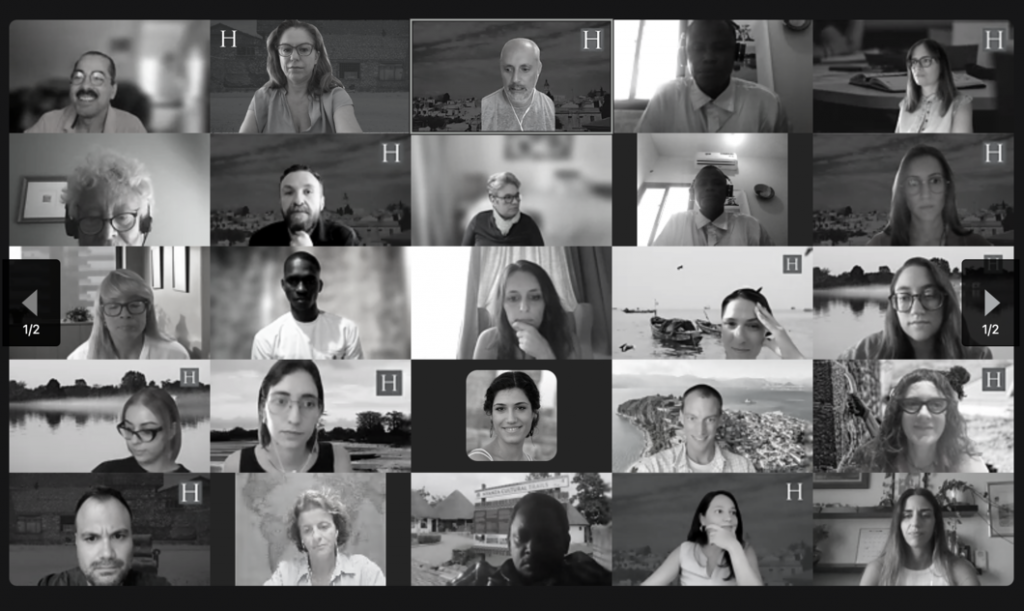: Projects
From Memory to Momentum: AHEAD Study Visit in Crete
From May 21st to 23rd, 2025, HERITΛGE and the Archaeological Museum of Mesara welcomed partners from across Europe for the second international AHEAD project Study Visit, a key milestone in the project’s mission to foster innovative, audience-centred cultural experiences. The three-day gathering hosted by the Museum (the project’s Greek Hub), proved a dynamic space for reflection, testing, and exchange of ideas across borders and communities.
The AHEAD team along with local heritage professionals and Elektra Angelopoulou – the artist selected to co-create work for the Greek hub- worked to validate and give feedback on the prototypes developed through the AHEAD methodology — a process designed to help cultural institutions understand their audiences, co-create with them, and embed those practices into their operations.
Two Prototypes, Two Publics
The Greek Hub focused on two distinct but equally vital local audiences: children and adults, engaging each group in a meaningful journey through AHEAD’s empathise–define–ideate–prototype–test framework.
Prototype I: Children’s Voices in the Museum
HERITΛGE and the Museum partnered with two local primary schools to involve young learners in the creative process. With the participation of artist/performer Elektra Angelopoulou, and through structured activities aligned with the AHEAD methodology, the children explored the museum’s collection and selected their favourite objects.From these choices, the children developed their own narratives — imaginative stories, reflections, and personal interpretations inspired by the artefacts.
In centering children’s voices, the museum embraces storytelling not just as education, but as connection — bridging past and present through creativity, wonder, and the eyes of a new generation.
Prototype II: Community, Connection, and Co-governance
In parallel, HERITΛGE invited local adults to participate in a series of reflective workshops, beginning with the sharing of memories, lived experiences, and deep-rooted connections to the Messara landscape — a place where archaeology, history, and daily life are inextricably linked.
These sessions revealed a strong sense of local pride, but also a disconnect: many felt the museum, though geographically close, was distant in spirit — shaped by state institutions without enough input from those who live nearby. In response, the prototype developed with this audience is the creation of a “Friends of the Museum of Mesara” Association.
This initiative aims to:
– Strengthen community engagement with the museum
– Amplify local voices in decision-making processes
– Support the museum’s role in driving tourism and sustainable local growth
– Provide a formal channel for co-creating future experiences and exhibitions
From Testing to Transformation
Both prototypes were presented to AHEAD consortium members during the Study Visit. Feedback sessions, held at the Archaeological Museum and visits to the area and its archaeological sites Gortyna and Phaistos, allowed partners to gain and exchange insights, and consider how these approaches might be adapted across other contexts.
The feedback underscored the importance of:
- Deep listening and long-term community involvement
- Rethinking traditional exchanges between museums and local communities
- Fostering sustainable links between heritage, education, and local development
- Working with the AHEAD methodology and returning to it as often as necessary throughout the lifetime of a project.
The prototypes — still in development — will be officially launched in September 2025, during a dedicated event that will also feature a site-specific performance by Elektra Angelopoulou, created in collaboration with the Mesara community.
Looking Ahead
This second Study Visit demonstrated the power of co-creation, memory, and local agency in shaping meaningful cultural heritage experiences. By validating the Greek Hub’s work and drawing lessons from the field, partners left Messara not only inspired, but equipped with ideas they could bring back to their own communities.
Next up for AHEAD: Study Visit 3 in Altamira, Spain — where a new chapter of audience-centred innovation is already unfolding.
AHEAD is co-funded by the European Union. To learn more about the AHEAD methodology or how to join the AHEAD network visit the project website and explore the learning resources, manifesto, and upcoming events.
Milestone project to preserve Buddhist Heritage in Pakistan completed
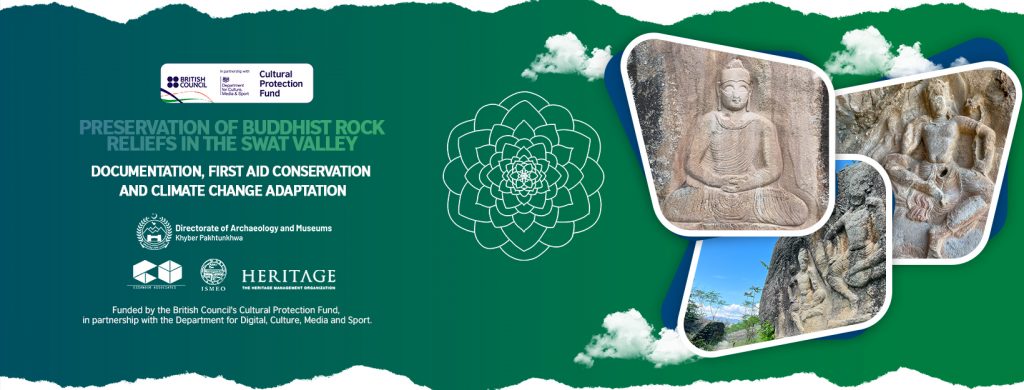 HERITΛGE is proud to announce the completion of the ‘Preservation of Buddhist Rock Reliefs in the Swat Valley: Documentation, First Aid Conservation, and Climate Change Adaptation‘ project, realised in collaboration with EssaNoor Associates, the Directorate of Archaeology and Museums KP, and the Italian Archaeological Mission in Pakistan, and made possible thanks to the support of the British Council’s Cultural Protection Fund.
HERITΛGE is proud to announce the completion of the ‘Preservation of Buddhist Rock Reliefs in the Swat Valley: Documentation, First Aid Conservation, and Climate Change Adaptation‘ project, realised in collaboration with EssaNoor Associates, the Directorate of Archaeology and Museums KP, and the Italian Archaeological Mission in Pakistan, and made possible thanks to the support of the British Council’s Cultural Protection Fund.
Swat Valley in northern Pakistan is home to some of the most significant remnants of the ancient Gandhara civilization. Among these are Buddhist rock reliefs and inscriptions, likely carved in the 7th or 8th century BC, which are now under threat from natural erosion, human activity, and the escalating impacts of climate change.
In response to these emerging challenges, the project adopted a multi-phase strategy encompassing digital documentation, emergency conservation, local capacity development, sustainable tourism, and climate resilience initiatives.
Through extensive field surveys, the project digitally recorded 78 Buddhist rock reliefs using high-resolution photography, 3D scanning, and interactive geographic mapping. Emergency stabilization measures were also carried out at several vulnerable sites, providing necessary ‘first aid’ to prevent further deterioration. A major milestone was the launch of the project website, which offers free access to 3D models, maps, and comprehensive documentation of these heritage sites. The platform supports research, education, and site management while promoting global engagement with Swat’s rich cultural heritage.
The local communities and institutions were engaged throughout the project to raise awareness and empower them to become custodians of these invaluable heritage sites through grassroots discussions and workshops. Thirteen heritage professionals and seven local community members were trained in digital preservation skills to ensure that the knowledge and tools for conserving the heritage are sustained locally, empowering the community to manage and protect their own cultural resources. The project also recorded six oral testimonies, preserving the intangible heritage of the local community. These stories reflect the lasting impact of Buddhist influence in the Swat Valley, highlighting traditional crafts like Gandharan wooden art, stone masonry, and shawl embroidery, which have been inspired by centuries of Buddhist heritage.
In addition to heritage conservation, the project identified sustainable tools for both preservation and economic development. The development of hiking trails and eco-tourism facilities was proposed to promote local tourism and provide sustainable income for rural communities. Alternative livelihoods through eco-tourism, local crafts, and medicinal plant cultivation are also encouraged by the initiative that aims to ensure economic stability in the region.
Closing Ceremony
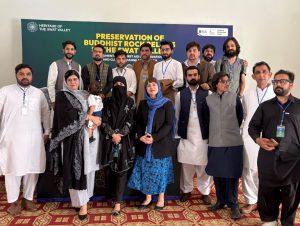 The Swat Museum hosted a project closing event on 15 April 2025, attended by approximately 200 people, including students, heritage practitioners, local community representatives, and international experts. The ceremony included a presentation by project team, detailing the objectives and accomplishments, as well as the official launch of the website. A panel discussion, chaired by HERITΛGE’s Dr. Maja Kominko, gathered professionals from both the academic and grassroots communities. The panel addressed the cultural significance of Buddhist heritage in Swat, the significance of community participation in conservation, and the adaptation to the impacts of climate change on heritage.
The Swat Museum hosted a project closing event on 15 April 2025, attended by approximately 200 people, including students, heritage practitioners, local community representatives, and international experts. The ceremony included a presentation by project team, detailing the objectives and accomplishments, as well as the official launch of the website. A panel discussion, chaired by HERITΛGE’s Dr. Maja Kominko, gathered professionals from both the academic and grassroots communities. The panel addressed the cultural significance of Buddhist heritage in Swat, the significance of community participation in conservation, and the adaptation to the impacts of climate change on heritage.
The guests were guided through a thoughtfully curated exhibit showcasing the project’s key outputs, including photographic documentation, interactive maps, and 3D-models. Team members were present to explain the conservation methods employed throughout the project and to demonstrate the digital equipment used in the preservation process. The ceremony concluded with the presentation of shields and certificates to honor significant contributions. Project stakeholders and members of the public reaffirmed their commitment to safeguarding Swat’s cultural heritage for the benefit of future generations.
The ‘Preservation of Buddhist Rock Reliefs in the Swat Valley’ project underscores the increasing significance of integrating digital technologies, emergency conservation, community engagement, sustainable tourism, and climate resilience into contemporary heritage conservation practices. It also serves as a model for future initiatives aimed at safeguarding vulnerable cultural heritage sites.
For additional information and access to digital documentation, visit www.heritageofswatvalley.com.
Preserving Shibam’s Heritage: A New Museum Takes Shape
A major step was taken in early February to safeguard the rich cultural heritage of the city of Shibam in Yemen, in the framework of the Preserving the Unique Earthen Architecture of Shibam project, funded by the ALIPH Foundation, is implemented by The Heritage Management Organization (HERITΛGE) in partnership with the American Foundation for Cultural Research (AFCR) and the General Organization for the Preservation of Historic Cities in Yemen (GOPHCY – Shibam).
Museum experts Shatha Safi and Khulod Najjar visited Shibam to guide the community-led design and planning of a brand new museum to be created by the project.
Old City of Shibam: a World Heritage Site
The walled City of Shibam is one of the oldest examples of urban planning based on the principle of vertical construction with impressive tower-like structures Following years of crisis brought about the war in Yemen, compounded by and the impact of climate change, this unique UNESCO World Heritage Site is facing significant challenges.
The proposed museum project addresses a request from the General Organization for the Preservation of Historic Cities in Yemen (GOPHCY) to create a centralized space that will bring together collections currently dispersed across several venues in the city. In addition to exhibiting Shibam’s history and artifacts, the museum will feature spaces dedicated to traditional arts and crafts, fostering cultural preservation and engagement. Furthermore, a dedicated room equipped with video-conferencing facilities will enable local residents to participate in online training and conferences. To ensure the sustainability of this training venue, the project will install solar panels and an internet connection, providing continuous access to digital resources.
The experts’ visit marked a crucial phase in the project; three key meetings were held to align the museum’s vision with community expectations and institutional support.
The first meeting focused on establishing a framework for the creation and operation of the museum. It brought together Hassan Aideed– Director General of GOPHCY – Shibam, the Local Committee for Museum Preparation, Hedaya Ghraibeh, Project Manager for HERITΛGE with the two visiting experts. Discussions revolved around how the museum can authentically represent Shibam’s history, traditions, and way of life while aligning with the aspirations of the local community. The experts emphasized the importance of preserving both the material culture—such as architectural heritage—and the stories, customs, and knowledge passed down through generations.
The second meeting allowed the project team, the visiting experts, and GOPHCY-Shibam to discuss the museum with Tariq Falhum, Director General of Shibam District and his team. This discussion highlighted the role of local authorities in supporting the museum’s development and ensuring its long-term sustainability. By integrating the museum into the broader heritage conservation strategy for Shibam, the project aims to strengthen both cultural preservation and community engagement.
The third meeting was held in coordination with the Women’s Development Administration at the District Office. This session brought together 15 women and girls from diverse backgrounds, including home-based workers, recent graduates, shopkeepers, and others, to discuss the evolution of traditional practices and contemporary lifestyles in Shibam. The conversation explored the challenges faced by women and the transformation of their position in society over time, providing valuable insights into the social and cultural shifts within the community.This meeting plays a vital role in ensuring that the museum accurately represents the experiences, voices, and contributions of women to Shibam’s heritage and daily life.
As the planning and design process continues, Shibam is moving closer to having a dedicated space that tells its story and brings the local community together.
The project provides practical, on-the-job training for heritage professionals in Shibam, ensuring that conservation efforts are sustained by skilled local experts. Currently, four trainees are already working alongside our architects and engineers on the documentation process for the South Palace, where the museum will be located.
The Preserving the Unique Earthen Architecture of Shibam project also includes architectural and infrastructure assessments in the first year, along with an in-depth study on climate action, proposing sustainable strategies for both Shibam and Wadi to ensure long-term resilience and preservation.
Two AHEAD labs take place in Crete
HERITΛGE in co-operation with the Archaeological Museum of Mesara in Greece held the first two labs EMPATHISE & DEFINE of the AHEAD program for the Greek hub on December 20-21, 2024. AHEAD (Accessible Heritage Experience for Audience Development) is an EU-funded program that aims to give cultural heritage professionals the tools to develop audiences using innovative approaches.
The labs marked a significant milestone in capacity building and following a series of intensive seminars. They provided a safe and collaborative space for heritage professionals, artists, and audiences to co-create innovative strategies for audience engagement and development.
Aris Anagnostopoulos, HERITΛGE head of Community Engagement, shared his expertise on audience engagement, guiding participants through the process of conducting empathetic interviews with local communities and students. His insights set the stage for meaningful interactions and the development of actionable steps to connect with target audiences effectively.
The enthusiastic participation of the museum staff made this initiative truly rewarding from day one.
Lab 1, focused on “Empathize,” featured two key phases:
- Step into My Shoes – Museum Perspective, which explored the museum’s understanding of its audience.
- Step into My Shoes – Audience Perspective, which shifted the focus to how audiences perceive the museum.
Lab 2 “Define” focused on conducting empathetic interviews and defining the specific needs of the targeted audiences. This workshop encouraged participants to engage directly with primary school students and the local community (including parents) to gain deeper insights into their perspectives, expectations, and experiences. Through active listening and thoughtful dialogue, the lab laid the groundwork for identifying key audience needs and developing meaningful, audience-centered approaches for cultural engagement.
With primary school students and the local community (including parents) as the target groups, these labs fostered open dialogue and mutual understanding.
Through these workshops and the broader AHEAD program,HERITΛGE and its AHEAD partners strive to build and sustain meaningful relationships between archaeological sites and their audiences, fostering connections rooted in empathy and shared experiences.
These labs are just the beginning of a six-lab series designed to transform how cultural heritage professionals engage with their communities. Stay tuned for more exciting developments in the months ahead!
Architectural heritage preservation project in Ukraine going strong
Our latest project in war-torn Ukraine has recently completed its first semester. Developed in collaboration with the Kharkiv School of Architecture (now relocated to Lviv) and Skeiron, a Ukrainian organization specializing in 3D documentation, this initiative addresses the urgent need to protect Ukraine’s architectural heritage by establishing an architectural conservation course for students at the Kharkiv School of Architecture. Additionally, it provides training for educators from architectural schools across Ukraine, enabling them to establish similar curricula in their own institutions. As part of the training process, the project will also contribute to creating documentation and conservation plans for monuments in western Ukraine.
The project kicked off on September 27, 2024, with a panel discussion on “Planning for the Post-War Rehabilitation of Ukraine’s Architectural Heritage.” Hosted at the Kharkiv School of Architecture’s Lviv campus, the event brought together leading Ukrainian and international experts in heritage preservation. The discussion set the stage for a two-year program packed with practical activities and tangible outcomes.
- Training the Next Generation of Heritage Architects. Central to the project is its commitment to nurturing a new generation of heritage architects. Spanning two academic years and four semesters, the program will engage two groups of architecture students from across Ukraine in immersive, hands-on learning experiences. Participants will gain practical expertise in 3D documentation, architectural analysis, conservation assessment, international conservation standards and understanding local legal frameworks. The curriculum is designed to prepare students for the complex demands and challenges of heritage preservation in a post-war context.
- Worldwide Expertise, Local Impact. As the project thrives on collaboration, its series of international webinars, lectures and events fosters dialogue between Ukrainian and global experts in heritage documentation and conservation. These public sessions are open to students, professionals, and educators, offering invaluable insights into the latest techniques and best practices. In the first semester alone, the project hosted three engaging webinars featuring outstanding speakers and practical discussions. Recordings of these sessions are available here, ensuring that the knowledge and expertise shared can reach an even wider audience.
- Learning by Doing: Digital Documentation Internships. One of the standout components of the project is its winter internship program. Under the guidance of Skeiron, students will step into the field to digitally document selected heritage sites. Using advanced tools like photogrammetry and laser scanning, they will transform raw data into actionable resources for conservation efforts. By the end of their internships, students will have created high-quality datasets ready to support heritage conservation projects across Ukraine.
- Empowering Educators. Recognizing that lasting change begins in the classroom, the project also offers specialized training for Ukrainian educators and researchers in the fields of architecture and heritage conservation. Through workshops and collaborative sessions, participants explore teaching methodologies and practical approaches to 3D documentation, heritage analysis, and conservation planning. Guided by leading Ukrainian and international experts, this training will equip the participants to develop and integrate heritage preservation courses into their institutions, ensuring the knowledge is passed on to future generations. The next course is set to begin on January 27, 2025. Interested participants can apply until January 6, 2025, by completing the application form available here.
Fall Semester Progress
The first semester of “Architectural Heritage Preservation in Times of War: The Ukrainian Model” brought together 30 highly motivated architecture students —20 from the Kharkiv School of Architecture and 10 from cities across Ukraine, including Kherson, Odessa, Dnipro, Zaporizhzhia, Kyiv, Lviv, and Chernivtsi.
The curriculum focused on equipping the participants with both the theoretical understanding and hands-on skills needed to digitally document Ukraine’s built heritage. The semester’s highlights included: mastering 3D mapping and surveying tools, applying spatial data for heritage management, and creating high-resolution 3D documentation.
The course was carefully tailored to address the unique challenges and opportunities faced by Ukrainian heritage professionals. By integrating lessons from the country’s past experiences and current realities, the program ensured that students could immediately apply their learning to real-world scenarios.
The knowledge and skills gained during the first semester will be put to the test as students embark on winter internships, set to begin on January 20, 2025. During these internships, participants will engage in hands-on fieldwork, live demonstrations, and practical applications of the techniques they’ve learned. Working with state-of-the-art equipment, they will scan and document selected heritage sites under the expert supervision of Skeiron LLC. These real-world experiences will not only solidify their training but also contribute to the preservation of Ukraine’s invaluable architectural heritage.
This semester’s accompanying webinars and public events were attended by hundreds of participants from around the world and are still gaining views online.
Looking Ahead
In the second semester, the students will explore the historical and technical underpinnings of conservation. The training for educators will significantly expand the impact of the project. The additional public events promise even more opportunities for the real-world application of innovative techniques and for strengthening Ukraine’s capacity for sustainable preservation of heritage.
Stay tuned for more updates as “Architectural Heritage Preservation in Times of War: The Ukrainian Model” continues to make a tangible difference in preserving Ukraine’s architectural legacy.
If you have any questions, please feel free to contact the project team at [email protected]
HERITΛGE Highlights 2024
Training
HERITΛGE celebrated a record-breaking milestone in 2024, training over 1,000 heritage caretakers in a single year. Participants engaged in a wide range of programs, including three-day workshops conducted online and in person, two annual summer schools focusing on digital tools and community engagement, and specialized training tailored to specific regions, topics and organizations. These included programs on Street Art in The Gambia (which also produced a new mural for the country’s National Centre for the Arts and Culture), Heritage interpretation in Rwanda, Project Management for US Heritage Managers, and an introduction to Fundraising and Project Management in Iraq.
Heritage Threatened by Conflict, Natural Disasters, and Climate Change
HERITΛGE continued its mission to protect heritage at risk worldwide, strengthening existing partnerships and forging new ones. In Ukraine, the Digital Museum project that was funded by the Creative Europe’s Culture Helps initiative, trained museum professionals to use digital tools, ensuring operational continuity and community access during wartime. Simultaneously, the two-year Architecture in Times of War: The Ukrainian Model initiative – delivered in cooperation with the Kharkiv School of Architecture and Skeiron and the support of the US Embassy in Kyiv – is equipping students and educators with digital skills to document, preserve, and restore architectural heritage.
In Türkiye, HERITΛGE published comprehensive reports documenting historic sites affected by the February 2023 Türkiye-Syria earthquakes. These reports include protection recommendations and advocate for enhanced cultural heritage recovery in affected provinces. Meanwhile, in Pakistan, a new project launched to safeguard the early Buddhist heritage of the Swat Valley, an area under threat from conflict, climate change, and rapid development. In Yemen, efforts continued to preserve the unique earthen architecture of Shibam, a UNESCO World Heritage Site struggling under the weight of a decade-long civil war.
HERITΛGE in Africa
The HerMaP Africa initiative, generously supported by the Mellon Foundation, has delivered significant impact. Over 75 small heritage projects received funding, alongside the awarding of several fellowships and the training of more than 370 heritage managers in Ethiopia, Ghana, and Rwanda. New partnerships were also established to further these efforts. In The Gambia, HERITΛGE’s ongoing HerMaP Gambia initiative, co-funded by the European Union, provided training to enhance the country’s culture and tourism sectors. The program also facilitated a parliamentary delegation study tour in Greece and partnered with the NCAC to launch the country’s Intangible Cultural Heritage Register, a project supported by UNESCO.
Giving Heritage Managers New Tools
HERITΛGE made strides in empowering heritage managers with innovative tools and practices. The EU-funded SHIFT project advanced its work to make heritage more accessible and inclusive, with a consortium meeting and project presentation held in Athens. The AHEAD initiative, co-funded by the European Union’s Creative Europe program, introduced seminars (now available online) and launched a community-based artistic project in Crete, with similar activities planned for Italy and Spain. HERITΛGE also announced the launch of EMPATHS, a project designed to promote participatory heritage interpretation through new tools and training resources.
Creating Networks, Connecting Professionals
Collaboration and community-building remained central to HERITΛGE’s mission in 2024. The organization continued developing Greece’s Living Heritage Network, supported by the Ministry of Culture, with HERITΛGE actively contributing to its digital and physical infrastructure, member recruitment, and communications. Additionally, the newly established AHEAD Network brings together heritage managers and community members who share a vision of audience engagement and participation.
Knowledge Sharing
HERITΛGE emphasized the importance of knowledge-sharing through active participation in global events and publications. Director Dr. Evangelos Kyriakidis delivered a keynote at the Choc Des Legendes Conference in Ghana, held under the auspices of the country’s First Lady. The organization also sponsored PastForward 2024, the annual conference of the US National Trust for Historic Preservation. Other highlights included workshops and presentations at the 30th Annual Meeting of the European Association of Archaeologists and the ReImagining Public Collections conference in Hungary.
HERITΛGE contributed to a Horizon Europe-funded policy brief on digital cultural heritage and shared expertise through webinars, seminars, and public lectures. Notable online resources include audience development webinars from the AHEAD initiative and webinars on architectural preservation in Ukraine.
1st Global Staff Summit
Reflecting the growth in HERITΛGE’s activities and team, the organization hosted its inaugural Global Staff Summit in September. This online event brought together staff working in Africa, Asia, Europe and the Americas , marking the beginning of an annual tradition to foster collaboration and alignment across our expanding network.

